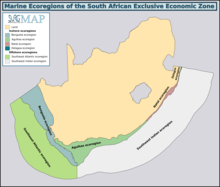List of brown seaweeds of South Africa
Seaweed, or macroalgae, refers to thousands of species of macroscopic, multicellular, marine algae.
The term includes some types of Rhodophyta (red), Phaeophyta (brown) and Chlorophyta (green) macroalgae.
In recent years, seaweed farming has become a global agricultural practice, providing food, source material for various chemical uses (such as carrageenan), cattle feeds and fertilizers.
Due to their importance in marine ecologies and for absorbing carbon dioxide, recent attention has been on cultivating seaweeds as a potential climate change mitigation strategy for biosequestration of carbon dioxide, alongside other benefits like nutrient pollution reduction, increased habitat for coastal aquatic species, and reducing local ocean acidification.
The IPCC Special Report on the Ocean and Cryosphere in a Changing Climate recommends "further research attention" as a mitigation tactic.

